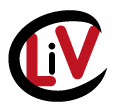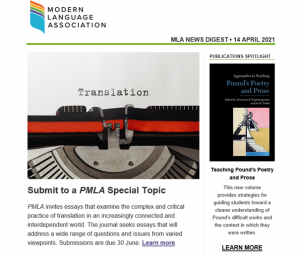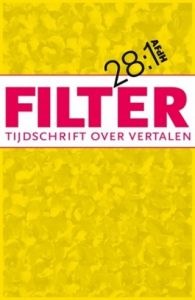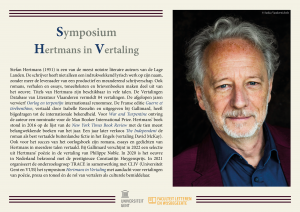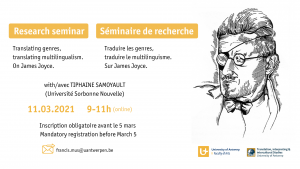De vakgroep Vertalen, Tolken en Communicatie (UGent) heeft een vacante betrekking voor een docent Vertaalwetenschap (tenure track 100%) in het vakgebied vertaalwetenschap Frans. Solliciteren is mogelijk tot 15 oktober 2021. Meer informatie is beschikbaar via deze link: Docent vertaalwetenschap VTC 2021
Symposium Hertmans in Vertaling
Op 21 oktober 2021 organiseert de onderzoeksgroep TRACE (Vakgroep Vertalen, Tolken en Communicatie, UGent) in samenwerking met CLIV het symposium Hertmans in Vertaling, met aandacht voor vertalingen van poëzie, proza en toneel én de rol van vertalers als culturele bemiddelaar. Het symposium vindt plaats in het gebouw van de Koninklijke Academie voor Nederlandse Taal-en Letterkunde (KANTL) te Gent.
Toegang: 5 EUR. Inschrijven kan via de Humanities Academie van de UGent (onderaan de pagina).
Programma: Hertmans in Vertaling
Voor meer informatie kan u terecht op de website en bij vragen of opmerkingen, gelieve Brecht de Groote (brecht.degroote@ugent.be) te contacteren.
cfp Retranslation, thirty years later / La retraduction, trente ans après
In 1990 markeerde “Retraduire“, het vierde nummer van het tijdschrift Palimpsestes, de groei van academisch onderzoek naar hervertaling. In 2023 wijdt Parallèles een special issue aan de thematiek, onder gastredactie van Kris Peeters (Universiteit Antwerpen) en Piet Van Poucke (Universiteit Gent). Voor meer informatie en de call for papers:
CFP_Retranslation_Parallèles_en CFP_Retranslation_Parallèles_fr
cfp PMLA Special Topic
De MLA News Digest van 14 april 2021 publiceerde een Call for Papers voor een PMLA special Translation issue. Meer informatie over het indienen van een manuscript vind je op de MLA website
Filter facelift
Het tijdschrift Filter, hét forum over literair vertalen in de Lage Landen, kreeg na 27 jaar vanaf januari 2021 een facelift en een nieuwe uitgever. Het papieren blad werd sinds 2013 versterkt met de Webfilter en met een indrukwekkend doorzoekbaar online archief. De redactie doet meteen ook een oproep tot steun om al dat moois in stand te kunnen houden. Meer info in de bijlage.
Workshops literaire vertaling VUB
Op de campus van de VUB worden in april drie workshops literaire vertaling georganiseerd:
1 april – Bart Vonck over de vertaling van García Lorca
22 april – Marijke Arijs over de vertaling van “Chicas muertas” van Selva Amada.
29 april – Trijne Vermunt over de vertaling van “Fila India” van Antonio Ortuño
Contacteer Philippe Humblé voor meer informatie.
Symposium Hertmans in Vertaling
In het najaar van 2021 organiseert de onderzoeksgroep TRACE (Vakgroep Vertalen, Tolken en Communicatie, UGent) in samenwerking met CLIV het symposium Hertmans in Vertaling, met aandacht voor vertalingen van poëzie, proza en toneel én de rol van vertalers als culturele bemiddelaar.
Lees hier alvast de aankondiging in het Nederlands en in het Frans.
Seminarie Joyce in vertaling UA
‘Omniscientific Joyce’ (Trieste, 14-18 June 2021)
Translating the Uncle Charles Principle
Call for Panel proposals
‘Omniscientific Joyce’, Trieste, 14-18 June 2021
Panel chaired by: Kris Peeters (UAntwerp) and Guillermo Sanz Gallego (VUB)
Abstract:
The omniscience of Joyce’s narrators goes a long way, as it pertains not only to characters’ inner thoughts, but also to their own formulation of these thoughts, i.e., their inner voices and idiosyncratic and sociolinguistic ways of expressing such thoughts. In Joyce’s world of words, characters have their own speech, and narrators tend to embrace these ways of expression typical of the focalizers and characters they speak of. However, this ‘Uncle Charles Principle’ (Kenner, 1978) entails more than just specific word choices. Characters’ voices and inner voices re-used by narrators are also a means of characterization, i.e., of portraying a specific character’s psychology and social class.
The subtlety of such double-voiced discourse in which characters’ speech and inner voices are reproduced by narrators constitutes a challenge for translators. Not only is double-voicedness easily overlooked, the stylistic variety it implies is at odds with ‘translation universals’, such as normalization, standardization, and conventionalization (Laviosa, 2001; Mauranen, 2007).
We invite Joyce scholars and translation scholars to reflect on why, how and to what extent the Uncle Charles Principle causes translation difficulties, and to analyze how Joyce translators have either overlooked or resolved these difficulties. We also invite speakers to reflect on how the translational phenomena observed may allow for a theoretical fine-tuning of Kenner’s principle. Examples may be drawn from translations of Dubliners, A portrait, or Ulysses into all languages, but should be limited to passages showing the Uncle Charles Principle.
Research questions may include, but are not limited to:
- (To what extent) Do translations show evidence of normalization / conventionalization of language when the Uncle Charles Principle is involved?
- Does normalization / conventionalization automatically lead to single-voiced narrators?
- (How) Do translators reconstruct double-voiced narrators in the translated text?
- (How and why) Does translation alter character psychology and characterization?
- Is there a difference in translators’ behavior with regard to characters’ speech as compared to characters’ inner thoughts?
- Is there a difference in translators’ behavior with regard to direct discourse, as compared to indirect discourse; with regard to free indirect discourse as compared to indirect discourse?
- Which aspects or configurations of the Uncle Charles Principle are recreated in translation, and which are not (or less)?
- Which translation strategies allow for a successful recreation of the Uncle Charles Principle and which translation strategies do not?
- Are there differences regarding the Uncle Charles Principle between translations in different languages; in different periods; in different cultural target contexts?
- Are there differences regarding the Uncle Charles Principle between first or early translations, and retranslations?
- What can translations and retranslations teach us with regard to the Uncle Charles Principle?
- What are the limits of Kenner’s principle in the face of translation?
Proposals – title and 200 to 300 word abstract – are to be addressed directly to kris.peeters@uantwerpen.be and Guillermo.Sanz.Gallego@vub.be,
no later than Feb. 12, 2021.
As panel chair, we will submit the panel proposal, including names, affiliations and titles of all speakers, by Feb. 15, 2021. Depending on the number of proposals we receive, we will decide whether to submit a single panel (of 4 speakers), or a double one (which would allow us to accommodate up to 8 speakers).
Doctoral Research Fellowship Oslo University
Het Department of Literature, Area Studies and European Languages van Oslo University heeft een vacature voor een Doctoral Research Fellowship in Franse literatuur/area studies met een speciale focus op de vertaling van herinneringsliteratuur. Meer informatie is beschikbaar via deze link: Research Fellowship Oslo 2021
